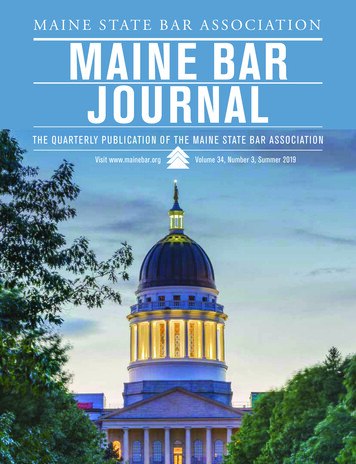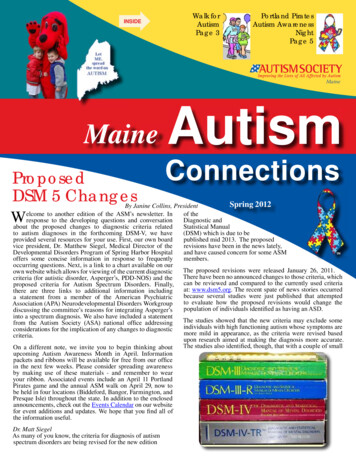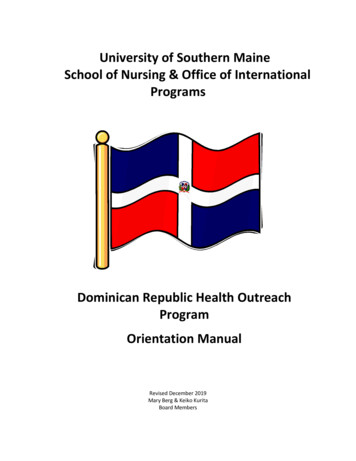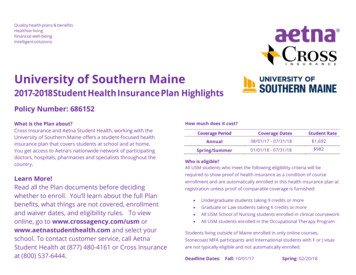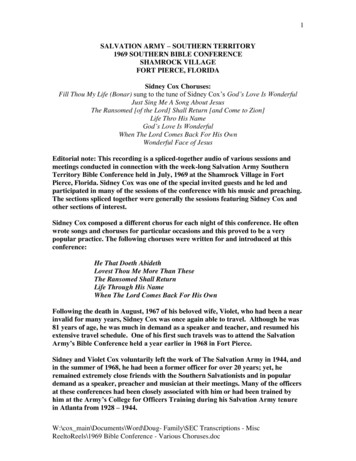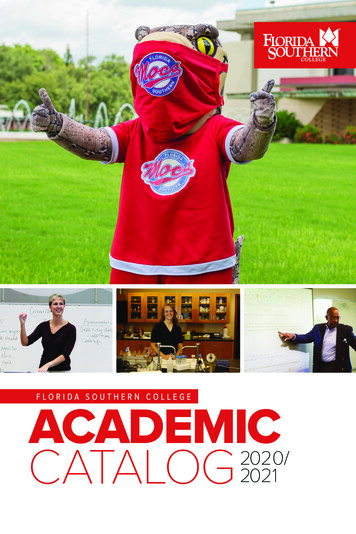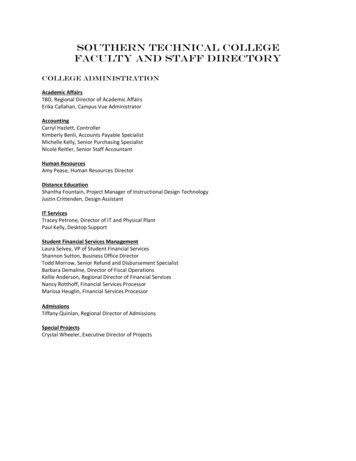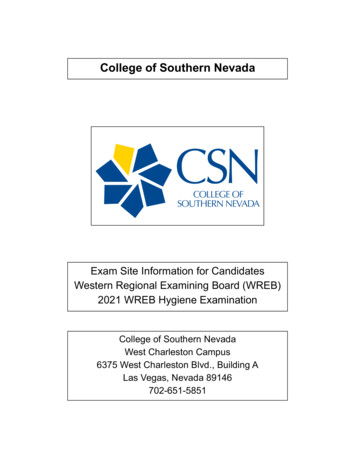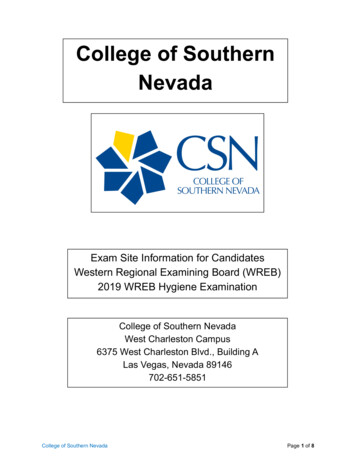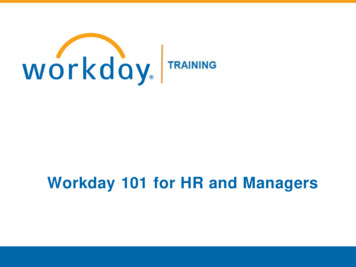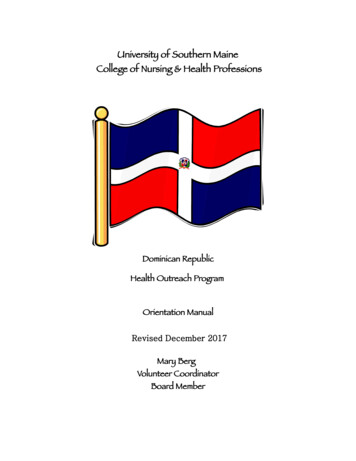
Transcription
University of Southern MaineCollege of Nursing & Health ProfessionsDominican RepublicHealth Outreach ProgramOrientation ManualRevised December 2017Mary BergVolunteer CoordinatorBoard Member
2University of Southern Maine College of Nursing and Health ProfessionsHola! Welcome to the Dominican Republic Health Outreach Project. Youare about to embark on a trip that offers many rewards. For students, it is achance to hone clinical skills under the watchful eye of nursing veterans as wellas to experience life and work in a different culture. The project givesvolunteers a chance to share their knowledge with nursing novices and to servepeople in need; in some cases,patients who have been treated for years. Theperspective you gain may well change the way you think about your own culture.Everyone’s experience will be unique.This manual is meant to help you plan for your trip. It is by no meanscomplete. Please share your suggestions for additions or revisions with faculty.The Project’s HistoryThis project is the result of a meeting between Dr. Anne Keith, then amember of the College ofNursing’s faculty, and Dr.John Consoli, a physicianwho works as a Catholicmissionary, at a restaurant inSantiago. Keith was in theDominican Republic on amissionorganizedbyIntercultural Nursing Inc.Their conversation about thearea’s health needs turned into a partnership that now spans over 20 years. Itbegan with eight USM nursing students and several interpreters traveling to theDominican Republic in 1995. Theirs was the first group to stay at Fusimana, themissionary center that Dr. Consoli and his wife, Jessica, operate in the village ofLajas.That first venture has turned into a twice-a-year program. USM nursingstudents and faculty, along with a host of volunteers, now provide medical care,personal care and health education to more than 1500 patients in 20 ruralvillages. Each day, the team – often made up of as many as 50-70 people –works out of homes, schools or chapels. They treat injuries, infection, andchronic health problems. They also teach nutrition, dental hygiene, and healtheducation. Students must raise about 4,500 to buy medical supplies for eachtrip.To date, USM’s Dominican Republic Health Outreach Project has servedmore than 15,000 patients.
3The project is headquartered at a Catholic retreat center in Lajas.You will be asked to respect the religious nature of the center,known as Fusimana. Someone may say grace before the eveningmeal. Mass is offered weekly at a nearby church and occasionally at Fusimana,though you are not required to attend. Our village clinics serve people of allfaiths. Church leaders are accountable for the results of our work, and werespect their guidance and culture at all times. We use the model of promotingpublic health in faith communities.Do I have to speak Spanish?No, although it’s certainly a great advantage. We will have interpreters on thetrip, so it is possible to go without knowing the language. However, we stronglyrecommend you learn some Spanish before the trip. Knowing even a little canmake a difference when working with patients.Where can I learn Spanish?For those in the Portland area, The Language Exchange offers Spanish classesat various levels, including private and semi-private /info/SpanishAn Introduction to Spanish for Health Care Workers: Communication and Culture ,Fourth Edition, by Robert O. Chase and Clarisa B. Medina de Chase (YaleUniversity Press) is a terrific book written by two health care workers, one ofthem Dominican-American, that includes online audio and video resources.yalebooks.com/medicalspanishISBN: 9780300212976Do I have to be in good physical shape?This is a very demanding work experience. You will find that there is somelifting, climbing in and out of vehicles, and walking over various types of terrain,as well as working 12 hour days. We recommend that you walk one to two mileseach day at least a month prior to the trip. Please include any physicallimitations in your letter of application. A brief medical history and emergencycontact form is required by USM/PRHDRGetting There
4Will we meet before the trip?Yes, there will be an Orientation at USM for all local volunteers and students.The event is video taped and is available for all who are unable to attend.Do I need a passport for this trip?Yes. Non-U.S. citizens must also have current documents, and some will need aspecial visa from the Dominican Consulate in Boston. PRHDR will need a copyof the photo page of your passport.How do I get a passport?For the most up-to-date information as well as all the appropriate forms, visitthe U.S. Department of State’s website at travel.state.gov. In a nutshell, if you’reapplying for a passport for the first time, you’ll need to appear in person at apassport processing center, typically a post office or courthouse (you can searchfor them by zip code at the State Department website). You’ll have to bring aphotographs of yourself that meets passport requirements; you can have it takenat places like a Fed Ex Office, Wal-Mart, or even some post offices for anominal fee. You’ll also need to bring proof of U.S. citizenship, such as anoriginal birth certificate, not a photocopy, and a valid form of photoidentification, such as a driver’s license. As of April 2015, a first-time passportcosts 135, payable by credit card, check, or cash. It takes about four to sixweeks for the application to be processed. Expedited service is available, butyou’ll pay about 60 extra plus the cost of shipping.If you have a passport that has expired, you can renew it by mail provided it wasissued within the last 15 years. Details are at travel.state.gov.What immunizations do I need?The College of Nursing requires that you follow recommendations issued by theCenters for Disease Control. That means that you must be up-to-date on thefollowing:* Diphtheria-tetanus (with pertussis if booster is due)* Typhoid (either oral live vaccine or killed injectable vaccine)*Hepatitis A (the USM Campus Health Centers offer an inexpensivevaccine)*Hepatitis B (series of three with new option ifdeparture is soon)*Polio and MMR (if you had this as a child longago, a booster is recommended)
5*Tuberculosis screening within one year (recommended.)Malaria prophylaxis should be considered based on CDC recommendations,though we have seen no cases in our area of the Dominican Republic. Malaria issensitive to chloroquine in the DR. Dengue viral fever, Chikungunya fever andZika virus have been reported in DR. DEET insect repellent and cover-upclothing can reduce your exposure. For more information, read the CDC’sadvisories for travelers at www.cdc.gov/travel/. You should allow at least twomonths to complete the required immunizations. The USM Campus Health Centerlocated in Gorham offers a travel clinic. For more information, call USM HealthServices 207-780-5411.Call the City of Portland Public Health, which offers an excellent vaccine serviceas well as tuberculosis skin tests through its Infectious Disease Program at 103India St. This service is open to everyone, regardless of residence, though anappointment is required. Call 207-874-8446 for an appointment or up-to-dateinformation on fees.Other Travel Medicine Clinics in Maine can be found at Maine.gov.Do I need to carry special health insurance?Yes. You must have coverage specifically for health care and medical evacuationabroad. If you are injured, it is important to have a means to secure safe and reliablemedical care and transport home. You will be exposed to tropical diseases and thepotential for accidents, as is always true when traveling in third world countries.Volunteers are asked to have current health coverage. The Volunteer Feecovers emergency evacuation through iNext.PackingWhat should I bring?Here’s the short answer: not nearly as much as you might think. The lighter youpack, the more comfortable you and your roommate(s) will be in your room –and the more medical supplies you can carry when you board the plane. It’s agood idea to talk with your roommate first to decide who will bring what. Youmight also want to pack your bags with the idea that you’ll leave behind someitems when you leave, such as bedding or shoes that are in good shape,toiletries, bug spray, and unopened snack foods. Anything we leave behind isgratefully accepted by the Peace Corps volunteers who serve asour interpreters, as well as the Fusimana staff.
6Three days’ worth of clothes, max. You’ll need suitable clothes for working inthe clinics (more on the dress code to follow). One of the perks of Fusimana isthe terrific laundry service provided by the center’s staff. Make sure you’velabeled your clothes. The staff will do all of the wash and have it back to youwithin two days, often within 24 hours They do ask that you wash your ownunderwear, so you might want to bring a small bottle of cold water detergent anda universal stopper for scrubbing in the sink. (By the way, gratuities for the staffare included in the fees you pay.)Here’s a basic packing list: Insect repellent (preferably w/DEET) for your skin – essential!Insect spray for ants, roaches and bed bugsAlarm clockShampoo & Soap or Body Wash (unscented if you’d like to determosquitos) Ziploc bags for personal use Sunscreen Hand Sanitizer Roll of Duct TapeCommand hooks and Para cords may be useful for managing yourmosquito netting and other things in your room. Deck of Cards/Travel Games/Cribbage (you will have down time atnight) Bath mats/towel (showers can leak – these will help keep your floorclean)Above italicized list can be shared expenses among roommates Fanny pack for passport, money, camera (wear daily)Passport (to be kept with you at all times)Copy of your Health Insurance Card and passportCamera with memory card and batteries (there is electricity tocharge batteries, but sporadic)Optional: thin sleeping bag/light blanket, and pillow (a compressibledown one is great because the pillows tend to be very thin there)Towels and wash cloth (your laundry is done for you so you maywant 2 of each so you don’t go without waiting for yours to return)Underwear, socks, night wear (it can be cool)Sneakers, and perhaps hiking boots for home visits, and/orcomfortable sandals. It can rain so prepare with foot wear appropriate forwalking on muddy ground and being wet.SwimsuitEar plugs (roosters and neighbors can be quite loud at night withconcrete walls.)Flashlight and batteries (preferably headlamp)
7 Tampons, sanitary pads, razorsFlip-flops to wear in the showerToothbrush, toothpasteBrush/Comb (leave hair dryers at home – you oftenwon’t have electricity, anyway)Sunglasses & hatUmbrella and/or pocket-size raincoat (expect some rain,guaranteed) Note: pack umbrella in your check in bag, they are notallowed in your carry-onHead Lamp (for clinics and to get around at night)Hand Sanitizer (for your daypack/fanny pack or your room)Clipboard & several pens for your assessmentsFacial Wipes (bring plenty of them!)Solar Water Bag (if you require hot showers)Snacks (such as energy bars, crackers, dried fruits, candy, cans oftuna – though don’t forget a can opener and mayo packets)Two water bottlesPersonal reading booksBackpackStethoscope (not required, but you may want your own. Clinics canget loud and not all of our stethoscopes are of the highest quality)3 scrubs (You are only required to wear a minimum of one scrubarticle each clinic day, but full scrubs are great too, not to mention veryprofessional)3 sets of casual clothing when not in clinic. This includes tshirts,modest tank tops, shorts, capris, sundresses, skirts, one “fun” outfit forparty night.Light fleece and/or fleece vest is recommended as the evenings canbe cool.Bubbles, Connect the dots, Stickers, Baseballs, Colored pencils,markers. (This is Optional - it’s not possible to bring enough treats for allthe children you’ll see but if you’re feeling generous and would like tobring something, you’re more than welcome. Anticipate between 20-30children in a given village)What do I need to work in the clinics?Medical professional students, staff and volunteers:Medical scrubs. You must wear a scrub top and/or scrub bottom. A modest, plainshirt with no writing, or a t-shirt (PRHDR shirts are perfect) as your otherarticle of clothing on clinic days. You should look like a medical professional.Bringing your own stethoscope is optional. A head lamp is helpful for clinicalassessments as well as getting around at night. You’ll need hand sanitizer forfrequent use at the clinic, so you might want to buy it in a container that can be
8clipped on to your fanny pack. Be sure to bring pens and a clipboard. Waterbottle. Back pack. Snacks.Non- medical staff and volunteers:Tops described above apply. Men might want to bring a shirt with a collar forsome occasions. Skirts at modest lengths, pants, capris are recommended forwomen. Pants or modest shorts are recommended for men. Dressing modestlyand neatly shows respect for the clients with whom you will be interacting. Handsanitizers apply. Water bottle. Back pack. Snacks.What about when I’m off duty?Modest shorts, T shirts, thick strapped tank tops, modest sun dresses. You willbe relaxing on the grounds at Fusimana. There will always be local peoplepresent and they look to us as professional role models. Reading, journaling,card and board games, jogging, walking the grounds, chatting with your missionmembers are all part of the mission. Always remember to repack the bins youare assigned to for the next clinic day.Should I pack any food?Yes. You’ll want to pack snacks as shopping is very limited in Lajas, and ourmeals will include frequent beans and rice. Two suggestions: Pack all food inZiploc bags unless you enjoy visits from bugs and rodents. Don’t pack anythingwith a lot of chocolate in it unless you enjoy melted chocolate. You might wantto pack small cans/packages of tuna fish or potted meats, peanut butter andcrackers, energy bars, cereal, candy, dried fruit or trail mix. Bring high-fibercereals if you need this in your diet. Can opener and mayo packets are handy.How much luggage can I take?You can take two pieces of carry one items, one carry-on piece of luggage andone smaller personal bag/backpack. Your checked bag must weigh less than 50pounds each. This bag will be a large duffel bag packed with medical supplies;this bag will be supplied by USM. There will be ample room and considerationfor you to pack some of your own personal items. Not everyone will have amedical bag. You should pack two days’ worth of clothing in your carry-on bag(in case your luggage is delayed or lost), as well as any supplies or medicationsyou may need. Luggage is sometimes delayed. For the latest packingregulations, visit the Transportation Security Administration’s website atwww.tsa.gov.Medical Supplies
9Where do the medical supplies come from?You may request donations from local churches, pharmacies, doctors’ offices,and hospitals. You may also request cash donations from organizations andmembers of your community. Some members will receive more donations thanthey can carry, while others will not receive as many. At our orientation we willorganize the supplies so that everyone will have a fairly equal amount to takewith them. Please do not accept any medications that will expire before youtravel. Each volunteer is strongly encouraged to raise approximately 300 inorder to provide the medications and supplies needed.What medications are most needed?Please check with your trip leader or volunteer coordinator for the latestinformation. We see about 1500 patients on each trip. Generally speaking theseare needed drugs: Antipyretics, analgesics: adult, infant, and childformulations of acetaminophen, ibuprofen, and aspirinAntacids: extra-strength generic is cheapestVitamins: adult and children’s multivitamins withiron, prenatal vitaminsAntimicrobialsAntifungal creams and orals: nizoral, nystatin,lotrimin, clotrimazole,AntihistaminesAntibacterial ointment: Bacitracin, triple antibiotic, bactroban(singles and tubes)Anti Inflammatories: ibuprofen, buffered ASA, naproxen,daypro, and othersCough and cold: adult and children’s cough syrups(Robutussin, Pediacare, etc.)We also need basic antihypertensives (if available in a large enough amount),diabetes medications (in large supplies only), and ophthalmic drops(erythromycin, floxins, sulfa, steroid-combo and lubricating drops). Check withleaders before accepting. We are stressing specific medications for consistencywith our communities and have been purchasing more in country.Miscellaneous supplies in need include non-latex gloves, 4-by-4 sponges,kerlex bandages, wound and ulcer care materials, cast shoes, ortho suppliessuch as soft support knee braces, wrist splints, hand splints, muscle rubs,walkers, wheelchairs, cushions, crutches and reading glasses.
10We also need supplies to perform lab tests for pregnancy, urine leukocytes.Glucometers are accepted if they have at least 25 strips and are a standard type.We urgently need large supplies of strips with matching meters. Please consultwith the team before bringing.What to Review before the Trip*Physical assessment skills, especially chest, skin, and children's ears.*Dermatology, especially fungal diseases, scabies, infections, and legulcer care.*Formulary of medications used. Volunteers, contact VolunteerCoordinator.*Treatment of intestinal parasite infections (pinworms and ascaris)“Helping Health Workers Learn,” by David Lerner. Available in bookstores oramazon is strongly recommended.At Last, Fusimana!What happens when we arrive at the airport?We fly into Santiago. A tourist card for 10 which is valid for 30days will need to be purchased. **make sure you pack a 10bill**. Next we collect luggage and pass through customs. You will complete anapplication for entry into the country. When asked to list your reason forentering the country, mark “pleasure.” Everyone helps to move all of thebaggage, and you will be responsible for your own luggage, including themedical bag assigned to you. We will pack the luggage into trucks and drive in aprivate bus about an hour from the airport to Lajas, the village that is home toFusimana. Be sure to take care of toileting needs before you leave the airport.Roads are bumpy. No stops.What is Fusimana?Fusimana is a Catholic mission retreat center for prayer. There are triple roomswith bathrooms, including flush toilets, sink and showers. Be prepared fornumerous little breakdowns. Use only bottled water to brush your teeth. Bottled
11drinking water will be provided. Do not put any paper in the toilet. You’ll begiven plastic bags for disposal. Plumbing is very fragile!What will we typically eat?Breakfast: bread, ham and cheese, hot cereal, coffee, fruit, cold cereal withboxed milk, or eggs.Lunch: Making peanut butter and jelly or cheese sandwiches for yourself isdone after breakfast and you carry your own. Fruit juice will be available.Dinner: rice and beans, chicken soup, cabbage salad, fried chicken or stewedmeat, eggs, fresh local fruits and vegetables, fruit juice.What if I am vegetarian?Many vegetarians have successfully completed the trip. However, it is importantto be flexible. The beans may be prepared with some meat broth, but they donot have any chunks of meat. The food is served buffet-style so that you will beable to pick and choose. Vegans will not have any problem as few foodsare prepared with dairy products.Will I have a roommate?Yes. At Fusimana the rooms are mostly triples, with metal bunk beds. If youhave a roommate in mind, your request will be honored as much as possible. Ifyou do not have a roommate, talk with faculty or volunteer coordinator. Theycan help you connect with other participants. A sign up sheet will be passedduring Orientation/Packing at USM.Are there bugs in the room?Yes, there can be ants, roaches, spi
University of Southern Maine College of Nursing and Health Professions Hola! Welcome to the Dominican Republic Health Outreach Project. You are about to embark on a trip that offers many rewards. For students, it is a chance to hone clinical skills under the watchful eye of nursing veterans
